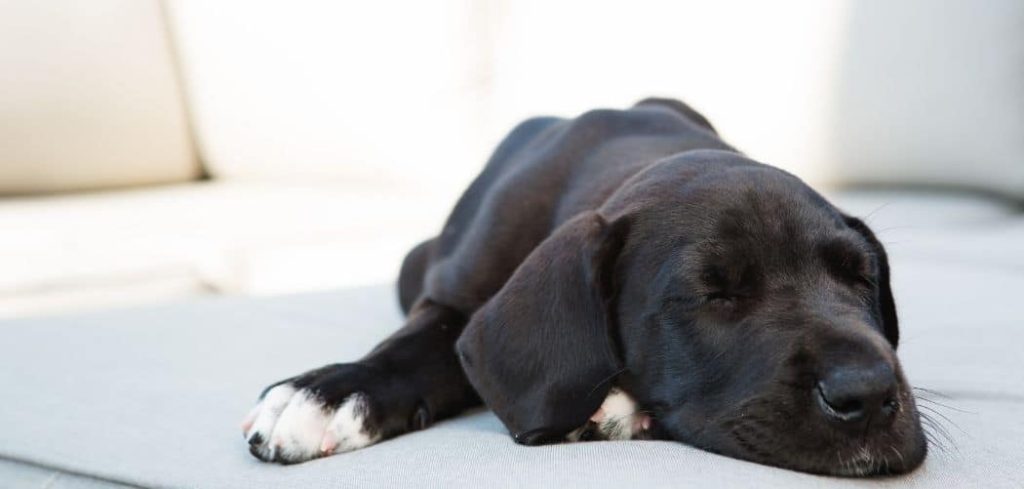Noticing your puppy having loose stool, even without other symptoms, can still be concerning.
Puppies are vulnerable to digestive upset, and changes in stool often signal something about their overall health.
While it may not always point to a serious illness, loose stool is never something to ignore in young dogs.
We outline the common causes of a puppy having loose stool with no other symptoms, what you can do at home, and when to seek veterinary help.
Table of Contents
Puppy Loose Stool No Other Symptoms — Why It Happens
Loose stool in puppies without other signs of illness is often linked to dietary changes, stress, or mild gastrointestinal irritation. Puppies have sensitive digestive systems that react quickly to even small changes. Common reasons include food transitions, eating things they shouldn’t, minor bacterial imbalance, or stress from new environments.
Sometimes, worms or mild infections can also play a role, even when your puppy otherwise seems normal.

Puppy Loose Stool No Other Symptoms: Common Causes
Dietary Changes
One of the most common triggers for puppy loose stool is a sudden change in diet. Puppies need gradual transitions when switching foods.
If you move too quickly from one brand or protein source to another, the gut bacteria don’t have time to adjust. This imbalance can result in softer stool without other obvious issues.
You may notice the stool becomes mushy within a day or two of the switch. Puppies usually remain playful, hungry, and hydrated, but their stool consistency is the main concern.
Read more: Puppy Loose Stool With Blood (What it mean)
Eating Something Unusual
Puppies are naturally curious and may chew or swallow items that don’t belong in their diet.
Whether it’s grass, sticks, small toys, or table scraps, these can irritate the stomach and intestines. Often, the result is temporary loose stool but no vomiting, lethargy, or other red flags.
While this is sometimes harmless, foreign objects can cause blockages if swallowed. Always watch closely for worsening symptoms.
Stress or Environmental Changes
Stress diarrhea isn’t limited to humans — puppies can get it too. Being rehomed, adjusting to crate training, or even loud household changes can upset a puppy’s digestion.
The gut and nervous system are closely linked, so stress can cause looser stools without making the puppy appear sick in other ways.
This kind of loose stool often resolves once the stressor is removed or the puppy adjusts.
Intestinal Parasites
Even if your puppy seems perfectly fine, parasites like roundworms, hookworms, or Giardia can cause loose stool.
Puppies are particularly prone to worms, and sometimes the only sign is softer stool or mucus in the stool. Because parasites can go unnoticed while still causing irritation, routine deworming is essential.
If left untreated, parasites may eventually lead to weight loss, poor growth, or anemia.
Mild Bacterial or Viral Irritation
Not all stomach infections make puppies severely sick. Sometimes, exposure to mild bacteria or viruses only results in loose stool without fever, vomiting, or lethargy. Puppies have developing immune systems that respond differently than adult dogs.
This can be especially common if the puppy has been around other dogs, kennels, or unfamiliar environments.
Food Intolerance or Sensitivity
Some puppies simply don’t tolerate certain ingredients well. Dairy, fatty scraps, or low-quality fillers in dog food may irritate their digestive system.
The result may be recurring soft stool, even though the puppy otherwise eats, drinks, and plays normally.
Identifying food sensitivities often takes trial and error, but once the trigger is removed, stool consistency usually improves.
What to Do If Your Puppy Has Loose Stool With No Other Symptoms
If your puppy has loose stool but seems fine otherwise, the first step is to remain calm. Monitor stool consistency, frequency, and any changes in behavior. Offering a bland diet of boiled chicken and rice for a short period can help settle the stomach.
Make sure your puppy stays hydrated, as even mild stool changes can cause fluid loss. Keep fresh water available at all times. Probiotics designed for dogs can also support healthy digestion.
Avoid giving treats, table scraps, or making sudden diet changes. Give your puppy’s digestive system a chance to reset.
If the stool improves within a couple of days, it’s often nothing serious. But persistence beyond that may indicate an underlying issue needing veterinary attention.
When to Call or Visit Your Vet
Even if your puppy seems fine, loose stool should not be ignored for long. If it continues for more than 48 hours, consult your veterinarian. Puppies are small, and prolonged digestive upset can quickly lead to dehydration or nutrient loss.
Call your vet immediately if you notice blood in the stool, black or tarry stool, frequent diarrhea, or if your puppy becomes lethargic, vomits, or refuses food and water. These may signal a more serious problem.
Parasites are also a frequent cause, so your vet may request a stool sample to run diagnostic tests. Early detection helps prevent complications and ensures your puppy continues growing strong and healthy.
Read more: Dog Watery Diarrhea No Other Symptoms (When to be concerned)
Key Takeaway
Loose stool in puppies without other symptoms is often mild, but it should not be dismissed. Dietary changes, stress, parasites, or food sensitivities are common causes.
While many cases resolve with simple care, ongoing or worsening symptoms need veterinary evaluation.
The best approach is to keep your puppy hydrated, feed a gentle diet, and monitor closely. With the right care, most puppies bounce back quickly. Trust your instincts — if something feels off, your vet is the best resource to protect your puppy’s health.
